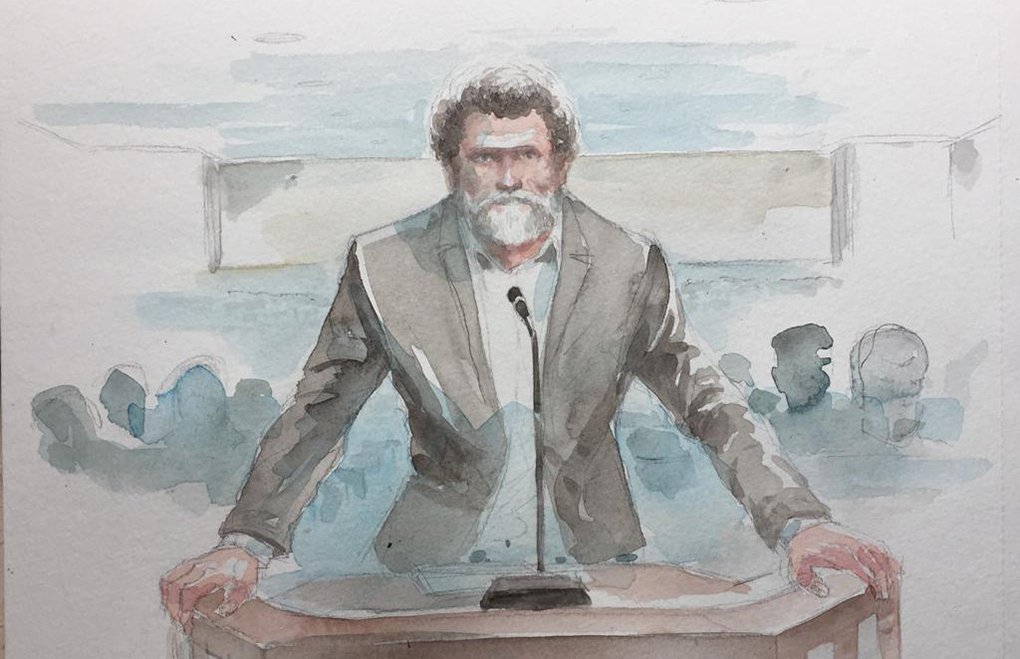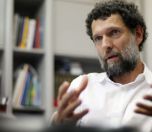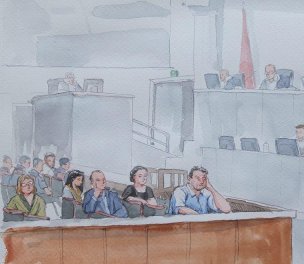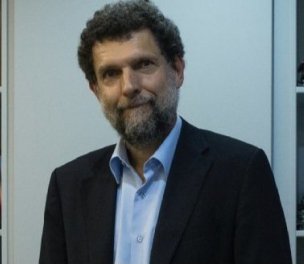* Image: Murat Başol
Click to read the article in Turkish
Ahead of the Gezi retrial on May 21, the attorneys of arrested businessperson and rights defender Osman Kavala have released a written statement titled, "Summary of the 3.5 years: Crime not found."
"Our country is going through extraordinary times when criminal cases that cannot be encountered in any state governed by the rule of law have become widespread," the attorneys have said, raising concerns that "practices that violate universal legal norms and even applicable laws and established judicial procedures have become daily occurrences."
Underlining that "the story of Kavala's detention is a remarkable example of the politicization of the judiciary and its use for political purposes," the statement has referred to his detention as "an example of the attempts to create crimes according to the person who is sought to be punished."
"It clearly shows how conspiracy theories can be used instead of evidence, ignoring not only legal norms but also the rule of reason."
Other highlights from the statement are as follows:
'ECtHR judgement circumvented'
"Kavala was arrested on 1 November 2017 on the charges of 'attempting to overthrow the government or to prevent it from exercising its functions' (Article 312 of the TCC) and 'attempting to overthrow the constitutional order through force and violence' (Article 309 of the TCC).
"He was acquitted in his trial for attempting to overthrow the government by acting as the financier and organizer of the Gezi Protests. After the decision of acquittal, he was not released but ordered detention again on the second charge, for which a release order had already been issued.
"In the meantime, the European Court of Human Rights (ECtHR) ruled that there was not any evidence to raise reasonable suspicion for the charge of overthrowing the government and other charges related to the attempted coup of 15 July 2016; that the detention constituted the abuse of power for political reasons; and that Kavala should be released immediately.
"A third charge, the charge of espionage (Article 328 of the Turkish Criminal Code - TCC), was brought in order to circumvent the judgment of the ECtHR and continue the detention.
"This charge was included in the second indictment issued against Kavala without explaining which classified information was the substance of the allegation of espionage and how and from whom it was obtained. The indictment also included incredible allegations that Kavala was in contact with the secret officers of the Gülenist organization, that he was involved in the attempted coup of 15 July, and that he even coordinated those who would take part in the new government to be established after the coup.
'Kavala never interrogated by prosecutor'
"In the indictment, it was alleged that Kavala had frequent contact with Henri Barkey, who was alleged to be a secret agent of the foreign powers behind the attempted coup, as a basis for the charges of espionage and supporting the attempted coup of July 15.
"The so-called evidence for this allegation was the fact that Kavala's mobile phone transmitted signals from places close to Barkey's location, even though his mobile phone was transmitting signals from his office, which was between the Divan and Hilton hotels. Furthermore, their mobile phones did not even transmit signals to the same cell tower. The explanation provided for the fact that there was no concrete evidence was that the relationship was maintained in a very secretive manner.
"During his imprisonment of more than 3.5 years when he was ordered detention on different dates in relation to the cases in which he was tried on highly serious charges such as overthrowing the government, being involved in the attempted coup, and espionage, Osman Kavala has never been interrogated by the prosecutor.
"Despite this severe lack of evidence, at different stages of the legal process the President made several remarks suggesting that Kavala was guilty. In one of these remarks, he criticized the decision of acquittal in the Gezi trial and described it as an operation to ensure the release of Kavala.
"In the hearing to be held in 30th Assize Court on 21 May, it is expected that the Gezi case concerning Kavala will be merged with the Gezi case concerning the Çarşı group, with both cases joined with the trial concerning the allegations of supporting the attempted coup of 15 July and espionage against Kavala. This is an attempt to establish a connection between different actions and people who do not know each other. This practice, which we have previously encountered in the Ergenekon and Sledgehammer trials, emerges as a convenient method for creating perception in political cases. It seems that the criminalization of the Gezi Events as a foreign plot through the judiciary will remain on the agenda of the politics and that the efforts to keep Kavala in prison will continue as a proof of this narrative."
A brief summary of Osman Kavala's detention17 October 2017: Osman Kavala was detained. 1 November 2017: Kavala was ordered arrest on the charges of 'attempting to overthrow the government or to prevent it from exercising its functions' (Article 312 of the TCC) and 'attempting to overthrow the constitutional order through force and violence' (Article 309 of the TCC). 24 December 2018: The investigation files under Article 309 and 312 of the TCC were separated. 19 February 2019: The first indictment against Kavala was issued under Article 312 of the TCC 16 months after he was arrested. 11 October 2019: A release order was issued in favor of Kavala on the charge under Article 309 of the TCC. 10 December 2019: The ECtHR ruled that Kavala's detention constituted a violation of human rights and that he should be released immediately. 18 February 2020: A decision of acquittal was issued in the trial heard under Article 312 of the TCC. 19 February 2020: After the decision of acquittal, Kavala was not released but was arrested again on the charge under Article 309 of the TCC. 9 March 2020: Kavala was ordered arrest under Article 328 of the TCC. 20 March 2020: The second release order was issued in favor of Kavala under Article 309 of the TCC. However, his detention on the charge of espionage under Article 328 of the TCC continued. 3 September 2020: The Committee of Ministers of the Council of Europe, which oversees the execution of the judgments of the ECtHR, ruled that the judgment of the ECtHR should be executed and that Kavala should be released immediately. 29 September 2020: The Constitutional Court of the Republic of Turkey decided to examine the application of Kavala regarding his unlawful detention. However, it postponed the examination as the second indictment including the charges under Articles 309 and 328 (espionage) of the TCC was submitted to the court on the same day. 29 September 2020: In the second meeting in which this matter was discussed, the Committee of Ministers of the Council of Europe ruled that an interim decision should be drafted to be issued in the event that the judgment of the ECtHR is not executed. 3 December 2020: The Committee of Ministers of the Council of Europe issued an interim decision that Kavala should be released immediately and that the Constitutional Court should examine the file in accordance with the judgment of the ECtHR without further delay. 15 December 2020: The Constitutional Court decided to examine the application regarding the unlawful detention and ruled that the file should be referred to the General Assembly of the Constitutional Court. 18 December 2020: The 36th Assize Court ruled that the detention shall continue. The second hearing was scheduled on 5 February. 29 December 2020: The Constitutional Court ruled with 8 to 7 votes that the decision of Kavala did not constitute any violation of right. The reasoned judgment included the strongly dissenting opinions of the judges who voted that the detention constituted a violation of rights. 22 January 2021: The Appellate Court overturned the decision of acquittal in the Gezi trial. It ruled that the file concerning this trial shall be examined together with the files under Articles 309 and 328 of the TCC. 28 January 2021: After the decision of acquittal was overturned, the 30th Assize Court issued a preliminary proceedings report and scheduled the trial concerning the consolidated files on 21 May 2021. 5 February 2021: In the trial heard in the 36th Assize Court, the Court ruled that Kavala's trial shall be consolidated with the Gezi Trial, which will be heard again in the 30th Assize Court under Article 312 of the TCC, and that the detention of Kavala on the charges of espionage under Article 328 of the TCC shall continue. 30 April 2021: As a result of its examination of the detention, the 30th Assize Court ruled that the detention of Kavala shall continue. 12 May 2021: In its weekly meeting of 12 May 2021, the Committee of Ministers of the Council of Europe reviewed Kavala's file and expressed their great concern that Turkish authorities and courts did not take the necessary steps to end Kavala's the continued detention against the judgment of the ECtHR. The Committee urged the member states to bring up the continued detention and immediate release of Kavala during their meetings with Turkish authorities. It pointed out that the detention of Kavala would be reviewed again by the 30th Assize Court on 21 May 2021, and urged the authorities to take all the necessary steps to ensure the release of Kavala. |
(HA/SD)






sa.jpg)



sa.jpg)
sa.jpg)


-132.jpg)